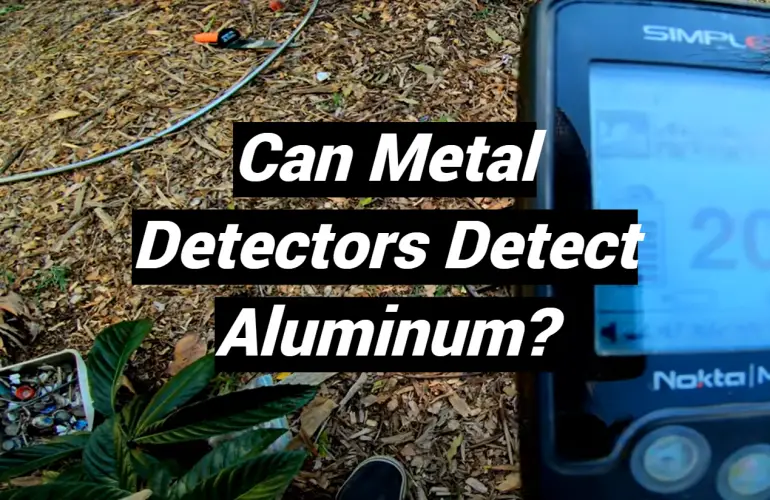There is a lot of confusion about whether or not metal detectors can detect aluminum. This is understandable, as aluminum is a relatively common metal and is used in many different applications. In this blog post, we will explore the answer to this question and help to clear up some of the confusion.
What Is A Metal Detector And How Does It Work?
Metal detectors are electronic devices that identify the presence of metal in a nearby area. Metal detectors can find metal objects that are buried underground or hidden inside of other objects. They are also used to detect stolen goods and contraband materials.
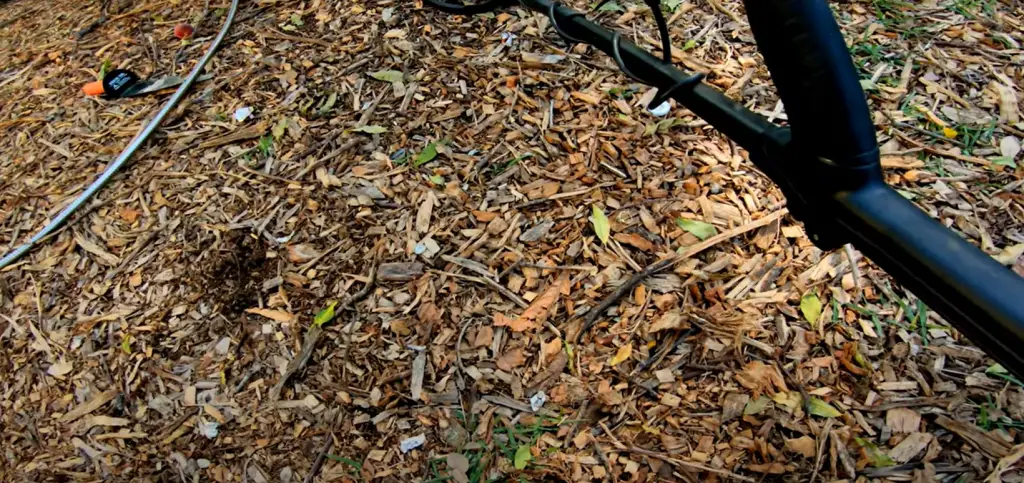
How does a metal detector work? A metal detector consists of two parts: a transmitter and a receiver. The transmitter produces a magnetic field, while the receiver is sensitive to changes in that magnetic field. If there is any conductive material (such as metals) nearby, it will alter the local magnetic field and the receiver will pick up this change. By carefully tuning the frequency of the transmitted signal, different types of metals can be detected. [1]
Types Of Metal Detectors
The three primary types of metal detectors are:
- Induction-balance: The most regularly seen type of metal detector is this one. It works by using two coils of wire to create a magnetic field. When metal is brought close to this field, it disturbs the balance between the two coils and this change is detected by the receiver.
- Pulse-induction: Pulse-induction detectors are mostly used for detecting metals buried underground. They work by sending out a burst of high-frequency pulses of electricity through a coil of wire. When these pulses encounter metal, they create a magnetic field which is picked up by the receiver.
- Beat-frequency oscillation: This type of detector uses two coils of wire, like the induction-balance detector. However, instead of both coils being used to create a magnetic field, one coil is used to detect changes in the local magnetic field while the other coil creates a reference signal. When metal is brought close to the detector, it disturbs the local magnetic field and this change is detected by the receiver. [2]
Can Metal Detectors Detect Aluminum?
Yes, metal detectors can detect aluminum. Aluminum is a metal, and metal detectors are designed to detect all types of metals. Whether or not the metal detector will sound an alarm when it detects aluminum depends on the settings that have been programmed into the device. Many metal detectors have a setting that allows users to ignore certain types of metals, such as aluminum, so that the detector does not sound an alarm every time it comes into contact with aluminum.
There are some types of aluminum that are more difficult for metal detectors to detect than others. For example, pure aluminum is more difficult to detect than aluminum alloy. This is because pure aluminum has a lower conductivity than aluminum alloy, which means that it does not allow electricity to flow through it as easily. As a result, metal detectors may have a more difficult time detecting pure aluminum than aluminum alloy.
The aluminum’s size also has an impact on how well it can be found by a metal detector. Smaller pieces of aluminum are more difficult to detect than larger pieces. This is because smaller pieces of aluminum have less surface area for the metal detector to come into contact with.
The type of metal detector also affects how well it can detect aluminum. Some metal detectors are better at detecting small, conductive objects than others. For example, pulse induction metal detectors are often used to find small, conductive objects that are buried underground. These types of metal detectors are often used in conjunction with ground-penetrating radar to locate buried pipes and cables.
If you are trying to detect aluminum with a metal detector, it is important to keep these factors in mind. The size, conductivity, and type of aluminum all play a role in how well the metal detector will be able to detect it. By taking these factors into account, you can increase your chances of successfully finding aluminum with your metal detector. [3]
What Metals Get Detected By Metal Detectors?
Stainless Steel
Stainless steel is a common metal that is used in many household items, such as appliances and silverware.
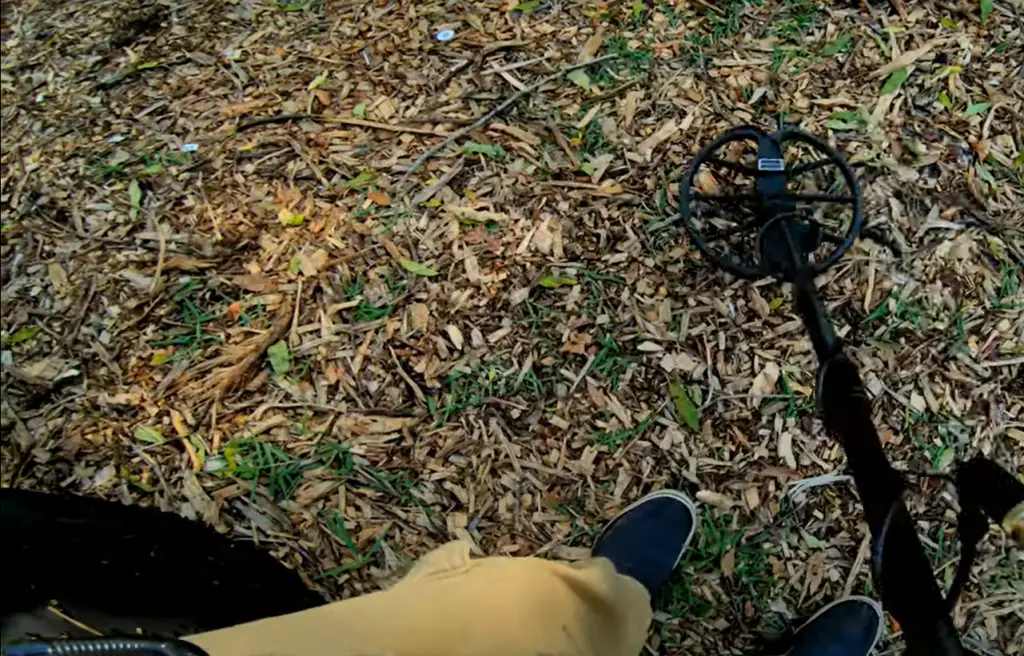
It is also a common material that is used in construction. Metal detectors can easily detect stainless steel.
Ferrous Metals
Ferrous metals are metals that contain iron. This includes cast iron, carbon steel, and tool steel. These metals are often used in the construction of buildings and bridges. Metal detectors are excellent at finding ferrous metals. [4]
Non-ferrous Metals
Non-ferrous metals are those that do not contain iron. This includes aluminum, copper, brass, and bronze. These metals are often used in the construction of electrical wiring and plumbing. Metal detectors are very good at finding non-ferrous metals.
Why Does Aluminum Cause Issues?
Aluminum is a metal that is used in many different industries. It is lightweight and has a high resistance to corrosion. These properties make it ideal for use in the construction of aircraft, automobiles, and buildings.
However, aluminum can cause issues for metal detectors. This is because aluminum is a non-ferrous metal.
As a result, they are difficult for metal detectors to find.In addition, aluminum is a conductive metal. This means that it allows electricity to flow through it easily. Metal detectors use electrical signals to find metals. If there is too much aluminum in the area, it can interfere with the metal detector’s ability to find other metals.
Aluminum can also be difficult to detect because it is often used in conjunction with other materials. For example, aluminum foil is often used to wrap food. The other materials surrounding the aluminum makes it difficult for the metal detector to find it.
Finally, aluminum comes in a variety of sizes.
This is because smaller pieces of aluminum have less surface area for the metal detector to come into contact with.Despite these challenges, metal detectors can still be used to find aluminum. By keeping these things in mind, you’re more likely to come across aluminum when using your metal detector.
What to Do If You Find Aluminum
If you find aluminum with your metal detector, there are a few things that you can do.
First, you can try to remove the aluminum from the area. This can be done by digging it up or by using a magnet to remove it.
Second, you can try to avoid areas where there is a lot of aluminum. This can be difficult to do if you do not know where the aluminum is located. However, you can use a ground-penetrating radar to help you locate areas where there is a lot of aluminum.
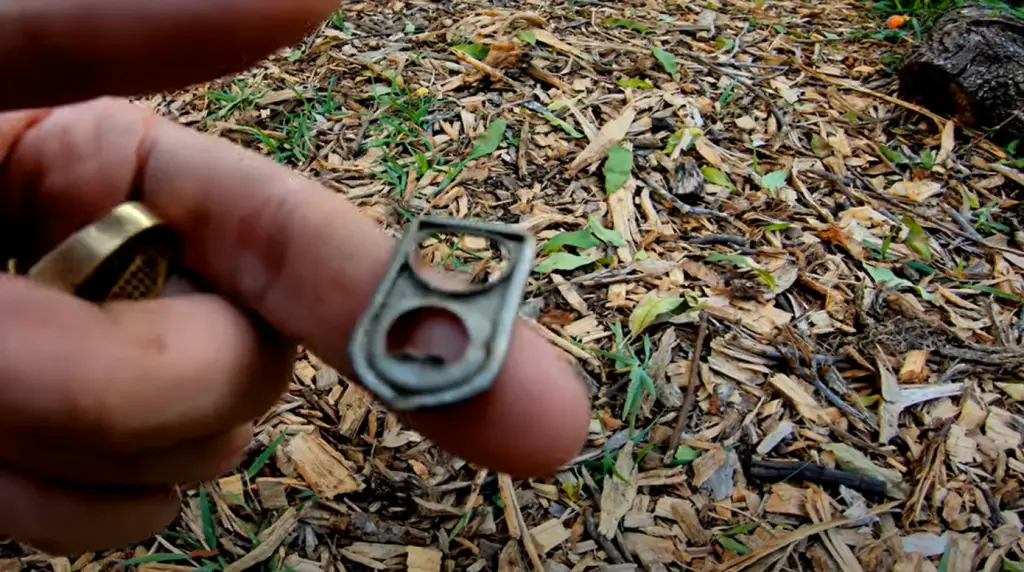
Third, you can try to use a different type of metal detector. Some metal detectors are more sensitive to aluminum than others. You can consult a metal detector expert to help you choose the right metal detector for your needs.
Finally, you can try to use a different type of search coil. Some search coils are better at detecting aluminum than others. You can consult a metal detector expert to help you choose the right search coil for your needs.
By taking these steps, you can increase your chances of successfully finding aluminum with your metal detector.
Does an Aluminum Foil Block Metal Detectors?
Aluminum foil does not block metal detectors. Metal detectors use electromagnetic fields to detect metals. Aluminum foil does not affect these fields. However, aluminum foil can be used to wrap food. This can make it difficult for the metal detector to find the aluminum because it is surrounded by other materials. [5]
What Settings Should You Use On My Metal Detector?
When trying to locate aluminum objects, it is important to use the correct settings on your metal detector. If your metal detector is not set to the right settings, it will have trouble detecting aluminum objects.
There are three main settings that you need to pay attention to when searching for aluminum objects: discrimination, ground balance, and sensitivity.
Discrimination is the setting that allows your metal detector to differentiate between different types of metals.
This will amplify your metal detector’s ability to detect aluminum.Ground balance is the setting that allows your metal detector to account for different types of soils and minerals in the ground. Different types of soils and minerals can interfere with the signals that your metal detector picks up. When searching for aluminum, you will want to set the ground balance to a higher setting. This will allow your metal detector to more easily pick up on the aluminum signals.

Sensitivity is the setting that allows your metal detector to pick up on faint signals. When searching for aluminum, you will want to set the sensitivity to a higher setting. This will allow your metal detector to more easily pick up on the aluminum signals.
By using the correct settings when searching for aluminum objects, you will be able to locate them more easily. If you are not using the correct settings, your metal detector may not be able to properly detect the aluminum objects.
FAQ
What metals can not be detected by a metal detector?
The following metals cannot be detected by a metal detector:
- Aluminum
- Tin
- Brass
- Bronze
- Copper
- Lead
- Stainless steel
- Steel
How do I know if my item is aluminum?
If you are unsure if your item is aluminum, you can test it with a magnet. If the magnet does not stick to the item, it is most likely made of aluminum. Another way to test if an item is aluminum is to use a metal detector. If the metal detector does not beep or make any noise, the item is probably made of aluminum.
Can Metal Detectors Detect Aluminum?
Aluminum foil is often used to wrap food, and it can be easily detected by a metal detector. However, thin sheets of aluminum, such as those found in aluminum cans, may not be detected by a metal detector. To test if your aluminum can will be detected by a metal detector, try wrapping it in foil. If the metal detector does not beep or make any noise, the can is probably made of aluminum.
How do you detect aluminum?
There are a few ways to detect aluminum. One way is to use a magnet. If the magnet does not stick to the item, it is most likely made of aluminum. Another way to test if an item is aluminum is to use a metal detector. If the metal detector does not beep or make any noise, the item is probably made of aluminum.
Can metal detectors detect aluminum foil?
Yes, metal detectors can detect aluminum foil. Aluminum foil is often used to wrap food, and it can be easily detected by a metal detector. However, thin sheets of aluminum, such as those found in aluminum cans, may not be detected by a metal detector. To test if your aluminum can will be detected by a metal detector, try wrapping it in foil. If the metal detector does not beep or make any noise, the can is probably made of aluminum.
What are the benefits of using aluminum foil?
There are many benefits of using aluminum foil. Aluminum foil is non-toxic, non-flammable, and conducts heat well. It also protects food from light and oxygen.
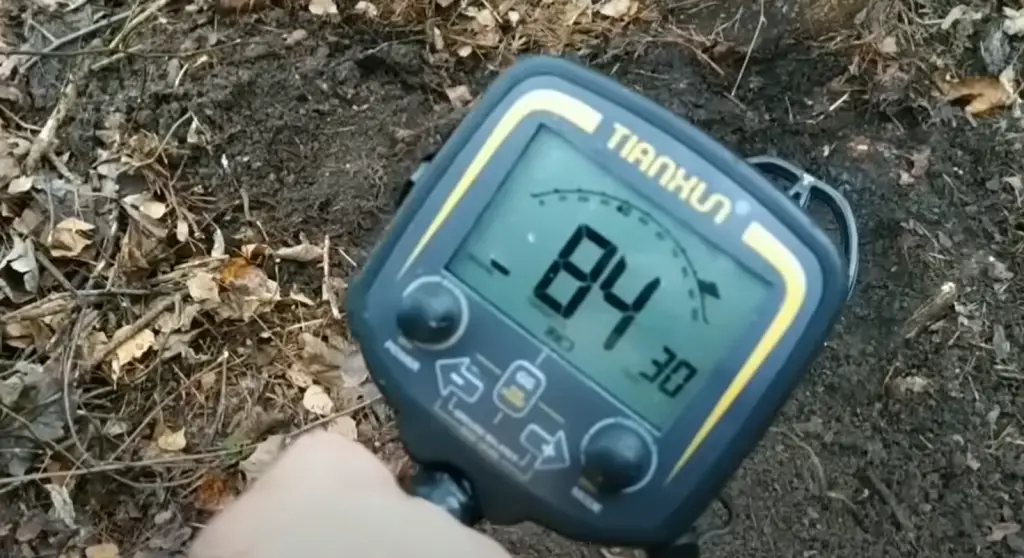
Additionally, it is recyclable and can be reused. What are the disadvantages of using aluminum foil?There are a few disadvantages of using aluminum foil. One is that it can be easily crumpled and torn. Additionally, it is a conductor of electricity, which means it can be dangerous to use around electrical appliances. Finally, it is not biodegradable and should not be put in the compost.
How do you recycle aluminum foil?
Most recycling centers will accept aluminum foil. To recycle aluminum foil, simply clean it off and throw it in the recycling bin. However, if your recycling center does not accept aluminum foil, you can reuse it yourself or throw it away.
What are some uses for aluminum foil?
Aluminum foil can be used for a variety of purposes. It can be used to wrap food, line baking pans, and make foil art. Additionally, it can be used to reflect heat, prevent freezer burn, and keep food fresh.
What material can block metal detectors?
There are a few materials that can block metal detectors. These materials include lead, tin, brass, bronze, and stainless steel. Additionally, aluminum foil can also block metal detectors if it is thick enough. To test if your aluminum foil will block a metal detector, try wrapping it around an item made of one of the materials listed above. If the metal detector does not beep or make any noise, the foil is probably thick enough to block the detector.
How do I make my own metal detector?
You can make your own metal detector by following these steps:
- Get a large piece of cardboard and cut out a circular shape in the middle.
- Cut two small slits in the top and bottom of the cardboard.
- Place a strong magnet in the top slit and a small metal object in the bottom slit.
- Hold the cardboard up to your ear and move it around until you hear the metal object inside the cardboard circle.
- You have now made your own metal detector!
How much metal does it take to set off a metal detector?
The amount of metal required to set off a metal detector varies depending on the type of metal and the sensitivity of the detector. However, it generally takes a larger amount of metal to set off a metal detector than most people think.
Do metal detectors detect diamonds?
No, metal detectors cannot detect diamonds. Diamonds are not made of metal, so they will not be detected by a metal detector. However, some other gemstones, such as quartz, can be detected by a metal detector.
What metal is easiest to detect?
The easiest metal to detect is iron. Iron is a ferromagnetic metal, which means it can be detected by a metal detector. Additionally, iron is the most widely used metal, so it is often the first metal that people think of when they are looking for metals.
Useful Video: Metal detector for detection aluminum-package
Conclusion
Yes, metal detectors can usually detect aluminum. However, there are a few factors that can affect how well a metal detector works with aluminum. The size and shape of the aluminum object, as well as the type of metal detector, can all play a role in how well the detector works. In general, however, most metal detectors should be able to find at least some aluminum objects.
References:
- https://www.minelab.com/knowledge-base/getting-started/how-metal-detectors-work
- https://www.researchgate.net/publication/317106127_Design_of_a_Beat_Frequency_Oscillator_Metal_Detector
- https://www.quora.com/Why-is-an-aluminium-alloy-stronger-than-pure-aluminum
- https://www.twi-global.com/technical-knowledge/faqs/ferrous-vs-non-ferrous-metals
- https://www.quora.com/Does-aluminum-foil-go-off-in-a-metal-detector?top_ans=321143318

